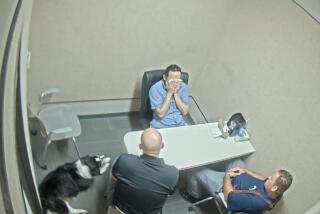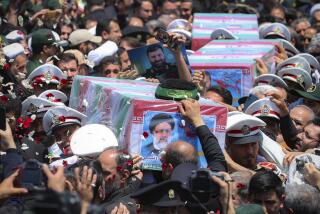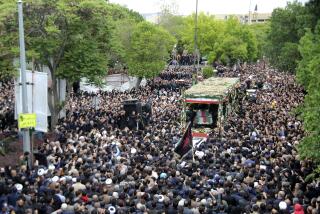Afghan Mourners Voice Doubts About Justice
- Share via
KABUL, Afghanistan — Afghan flags flew at half-staff throughout the country and radio programs were banned from playing music during a national day of mourning Tuesday for slain Vice President Haji Abdul Qadir, even as many Afghans expressed doubts that his killers would be caught.
In particular, many of Qadir’s fellow ethnic Pushtuns said they believed that the case would be treated much like that of Air Transportation and Tourism Minister Abdul Rahman, who was slain Feb. 14. Then, the government pledged to bring the killers to justice and even named suspects, but the key figures were not arrested.
“They will not find the murderers of Haji Qadir,” said Shamal Hoda, 25, a medical student who attended the prayers held Tuesday for Qadir at a mosque in central Kabul. “It will be the same as it was with Minister Abdul Rahman. In that case, the murderers are known, but they are not arrested.
“Those who killed Haji Qadir are supported by great powers,” Hoda said. “He was killed in the middle of Kabul.”
President Hamid Karzai attended the prayers, along with hundreds of other Afghans, and said he had lost “my brother and my right hand.” He promised Qadir’s family and friends that the killers would be brought to justice.
Qadir was slain Saturday by a pair of gunmen as he drove away from his office in Kabul, the Afghan capital.
A close examination of the many people who might have killed him reads like a litany of Afghanistan’s problems and the difficulties facing the new government as it attempts to impose the rule of law.
Suspects include ethnic rivals; drug dealers who lost money as a result of Qadir’s policies; outside provocateurs, such as warlord Gulbuddin Hekmatyar or former Taliban members; and members of the predominantly ethnic Tajik Northern Alliance, who helped oust the Taliban from Kabul last year.
Afghan police authorities, who are predominantly Tajiks, say they are pursuing the case, but it is hard to get specifics about what they are doing. Police quickly arrested 10 security guards posted at the Ministry of Public Works, which was near the site of the assassination, but few people believe that they are the culprits. Two other men were arrested later, but little is known about them.
Kabul Police Chief Gen. Abdul Basir, a former Northern Alliance commander, said his investigation was focusing on Hekmatyar and on the family of Commander Shomali, a warlord in eastern Afghanistan. Basir said he was leaning toward the theory that the former was responsible.
“Gulbuddin is a prime suspect; he wants to show the world and Afghanistan that there is no security and no peace and that even the deputy to the president can be killed,” Basir said.
However, he could cite no evidence pointing to Hekmatyar, the head of a militant Islamic party that opposes the presence in Afghanistan of foreign troops with the U.S.-led coalition.
Western diplomats and knowledgeable observers say it is unlikely that Hekmatyar, the Taliban or the Al Qaeda terrorist network is responsible.
“Al Qaeda and Hekmatyar are such convenient excuses,” one diplomat said. “You have to ask: Who benefits from [Qadir’s] death, and it certainly looks as if the Northern Alliance does, since they would like to have someone they like govern Nangarhar” province, where Qadir was still governor when he was slain.
This is Afghanistan at its most shadowy, filled with internecine rivalries and cross-cutting agendas
As one of five vice presidents, Qadir was the highest-ranking ethnic Pushtun in the government, other than Karzai. He was also the minister of public works. His province, Nangarhar, is one of the wealthiest in Afghanistan because of its border with Pakistan, which makes it a smugglers’ haven, and its poppy cultivation, which is used to produce opium and heroin. Many people would have liked his access to customs tariffs and his influence over the drug trade. He reportedly had been involved in both smuggling and the poppy business.
Although Qadir was a member of the Northern Alliance, he sought to limit its influence in eastern Afghanistan. Other leaders from the region, notably warlord Hazrat Ali, are closer to Defense Minister Mohammed Qassim Fahim, a Tajik.
Northern Alliance officials denied that they had reason to undercut Qadir, saying that such a suggestion was propaganda imported from Pakistan aimed at sowing discord.
“Inasmuch as we know, Haji Qadir was very nice and good, he was working with the Northern Alliance and we didn’t have any problem with him,” said Hafiz Hakim, a member of the Northern Alliance and an official in the Department of Intelligence, which is involved in investigating the case,
Each possible explanation in Qadir’s death has its own set of difficulties when it comes to capturing and prosecuting the killers. Perhaps in tacit recognition of the obstacles facing Afghan officials, Karzai requested the help of the International Security Assistance Force, and it was quickly granted.
Finding the killers is only one of the government’s problems. Because Qadir held three posts, each must be filled and each represents a highly political decision. Already, Qadir’s relatives and local warlords are jockeying for the jobs.
Many Pushtuns made it clear that they suspected political motives in the killing. Although none felt comfortable pointing fingers explicitly at the Northern Alliance, they raised doubts about every other option.
On Tuesday, a street near the mosque where the prayers for Qadir were held was teeming with turbaned Pushtuns who had traveled far, some for as many as two days over rugged roads, to pay their respects. Typical of the mourners was Mohammed Hossain Hassan, 70, who had come from Konar province in the far northeast. “To my mind, this was a political assassination,” he said.
“Haji Qadir was the leader of the whole Pushtun nation. Opium dealers and rivals from Jalalabad [the capital of Nangarhar] could have killed him there any day, but he was killed here in Kabul.
“And I refuse to believe it was Gulbuddin; there are other people he would have wanted to kill first. It was political,” he repeated as he climbed into a car, preparing to start the journey back home.
More to Read
Sign up for Essential California
The most important California stories and recommendations in your inbox every morning.
You may occasionally receive promotional content from the Los Angeles Times.













